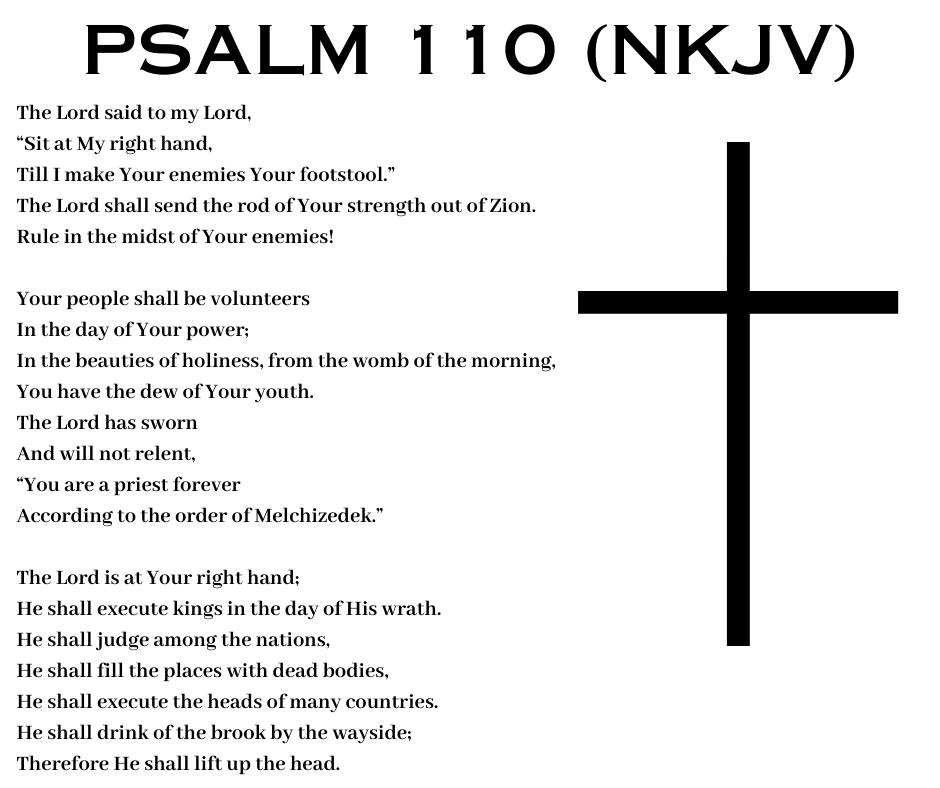Interpreting Psalm 110
It’s a multi-layered piece of Scripture integral to shaping Christian understanding of the Messiah’s dual role as King and High Priest.
Few passages in the Old Testament have been as influential and as frequently cited in the New Testament as Psalm 110. Psalm 110 was penned by King David of Israel, and is considered a prophetic declaration of the Messiah’s divine priesthood and kingship. This iconic passage of Scripture offers a unique blend of royal and priestly themes that resonate powerfully within Christianity (and Judaism too).

As a “Messianic Psalm,” Psalm 110 foretells the coming Messiah. The New Testament references this Psalm to establish it as a key Old Testament prophecy of Christ’s ministry. Interpreting Psalm 110 explores the evolving message and key takeaways from the text, while examining why this piece of scripture remains influential for contemporary Christianity.

Interpreting Psalm 110
Psalm 110 has been subject to diverse interpretations throughout history, reflecting the theological and cultural perspectives of various scholars. In ancient Israel, the psalm was likely understood as a royal hymn, celebrating the triumph of a Davidic king over adversaries. The speaker identified as Yahweh, the God of Israel, and the one addressed as “my Lord” represented the Davidic ruler. This interpretation emphasized the king’s authority and power, envisioning a future era when he would conquer enemies and establish a just and peaceful kingdom.
In the New Testament, Psalm 110 took on a messianic significance. Jesus himself referenced this psalm during his trial before the Sanhedrin, while the author of Hebrews extensively cited it to argue that Jesus was the perfect high priest in the order of Melchizedek. The New Testament viewed the psalm as a prophecy of Jesus’ victorious triumph over death and his exaltation to God’s right hand.
Over the centuries, interpretations of Psalm 110 have continued to diversify. Some scholars maintained the psalm’s royal character but associated the king with Jesus Christ. Others perceived the psalm as messianic but applied it to messianic figures in general. Additionally, some interpreted the psalm as a prophecy of the forthcoming Holy Spirit.
Messaging Within the Text
Both biblical scholars and the faithfull bring distinct viewpoints to their analysis of Psalm 110. Both Jews and Christians consider this psalm significant, and find inspiration and guidance within its verses. Some of the key takeaways from Psalm include:
1. The Messiah’s Kingship
The Psalm begins with the LORD saying to my Lord, “Sit at My right hand, Till I make Your enemies Your footstool.” This prophesies the ascension of Jesus Christ, sitting at the right hand of God, the position of honor and authority (Mark 16:19).
2. The Messiah’s Priesthood
Verse 4 declares, “The Lord has sworn and will not relent, ‘You are a priest forever According to the order of Melchizedek.'” This refers to the unique priesthood of the Messiah, not based on lineage but on an everlasting life. This theme is further developed in the book of Hebrews (Hebrews 7).
3. The Divine Warrior
Verses 5-7 depict the Messiah as a divine warrior judging among the nations, and reflects the belief in Jesus’ second coming when He will judge the entire world (Revelation 19:11-16).
4. Voluntary Submission
Verse 3 talks about the people offering themselves willingly, reflecting the Christian call to enthusiastically submit to Christ’s lordship.
5. The Victorious King
The Psalm concludes with a victorious king who exalts himself after a battle, which is commonly regarded as a prophecy of Christ’s ultimate victory over sin and death (1 Corinthians 15:57).
Modern Influence in Christianity
Psalm 110 remains influential in modern Christianity for several reasons:
1. Christological Interpretation
The Psalm is interpreted Christologically, meaning that it’s seen as a prophecy about Jesus Christ. This interpretation is backed up by the repeated references to this Psalm in the New Testament, which in itself underscores the passage’s relevance.
2. High Priestly Role of Jesus
Psalm 110 mentions the “order of Melchizedek ‘ and forms the basis for understanding Jesus’ unique type of priesthood, which is further expanded on in the book of Hebrews.
3. Worship and Liturgy
The Psalm is often used in Christian worship, such as during Ascension Day, to reflect the belief in Jesus’ ascension and his seat at God’s right hand.
4. Understanding the End Times
The portrayal of the Messiah as a divine warrior gives insight into eschatological themes , which are those relating to death, judgment, and the final destiny of the soul and of humankind).
Conclusion
Psalm 110 is a rich, multi-layered piece of scripture that shapes Christian understanding of the Messiah’s dual role as King and High Priest. Its enduring relevance lies in its Christological focus, deep theological insights, and its liturgical function. Studying this Psalm helps believers gain a deeper appreciation for the person and work of Jesus Christ, and the divine plan that unfolds throughout the narrative of the Bible.
SKM: below-content placeholderWhizzco for FHB

